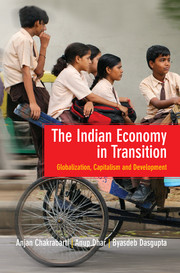Book contents
- Frontmatter
- Contents
- Preface
- Introduction
- Chapter I The Condition of the Working Class in Contemporary India
- Chapter II Capitalism: The ‘Delusive Appearance of Things’
- Chapter III Post-colonial Development and ‘The Thought of the Outside’
- Chapter IV The Word and the World of Neo-liberalism
- Chapter V The Scrypt of Transition: Between the Spectral and the Secret Thereof
- Chapter VI From Self-reliance to Neo-liberalism: The Political Economy of ‘Reform’ (1991–2014)
- Chapter VII Global Capitalism and World of the Third: The Emergent Cartography of the Indian Economy
- Chapter VIII Inclusive Development, State and Violence
- Chapter IX From Economic Crisis to Transition Crisis
- Conclusion
- Bibliography
- Author Index
- Subject Index
Chapter V - The Scrypt of Transition: Between the Spectral and the Secret Thereof
Published online by Cambridge University Press: 18 December 2015
- Frontmatter
- Contents
- Preface
- Introduction
- Chapter I The Condition of the Working Class in Contemporary India
- Chapter II Capitalism: The ‘Delusive Appearance of Things’
- Chapter III Post-colonial Development and ‘The Thought of the Outside’
- Chapter IV The Word and the World of Neo-liberalism
- Chapter V The Scrypt of Transition: Between the Spectral and the Secret Thereof
- Chapter VI From Self-reliance to Neo-liberalism: The Political Economy of ‘Reform’ (1991–2014)
- Chapter VII Global Capitalism and World of the Third: The Emergent Cartography of the Indian Economy
- Chapter VIII Inclusive Development, State and Violence
- Chapter IX From Economic Crisis to Transition Crisis
- Conclusion
- Bibliography
- Author Index
- Subject Index
Summary
The key word, no doubt unutterable… and unknown for the moment, would have to be polysemic, expressing multiple meanings through a single phonetic structure. One of these would remain shrouded, but the other, or several other meanings now equivalent, would be stated through distinct phonetic structures, that is through synonyms… We would call them cryptonyms (words that hide) because of their allusion to a foreign or archaic meaning… Certain words suffered an extraordinary exclusion and that this same exclusion seemed to confer on them a genuinely magic power… because a given word was unutterable that the obligation arose to introduce synonyms even for its lateral meanings, and that the synonyms acquired the status of substitutes. Thus they became cryptonyms, apparently not having any phonetic or semantic relationship to the prohibited [or the taboo] word.
Abraham and Torok, 1986: 18–19When the somewhat polysemic experiences, empirical descriptions, or scripts of transition are invoked or written, they are, wittingly or unwittingly, accompanied by some idea of transition, if not outright philosophies of transition. While this is in itself a complex issue whose details need not bother us here, our problem at hand, i.e., theorizing the transition of the Indian economy, transition that is always already transitory, forces us to contend with three such philosophies and scripts of transition. We shall also ask in this context: Is transition a trope, a trope to silence, to render ‘unutterable’ and ‘unknown’, to ‘shroud’, ‘hide’, ‘exclude’, or ‘prohibit’ some key word(s)?
The script(s) of transition: Transition as big bang change
The first script views transition as ‘big bang change’. This assumes that transition indeed happens, usually in a ‘big bang’ way.
- Type
- Chapter
- Information
- The Indian Economy in TransitionGlobalization, Capitalism and Development, pp. 145 - 167Publisher: Cambridge University PressPrint publication year: 2015

